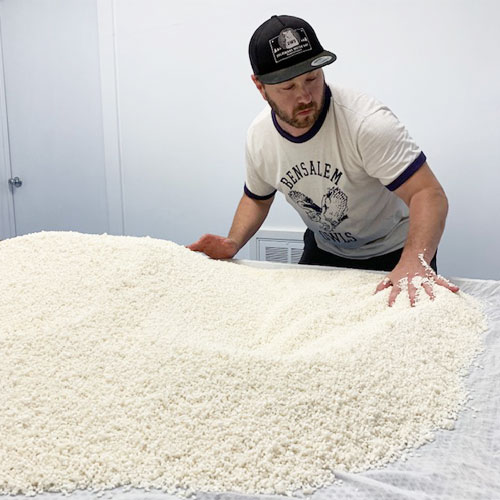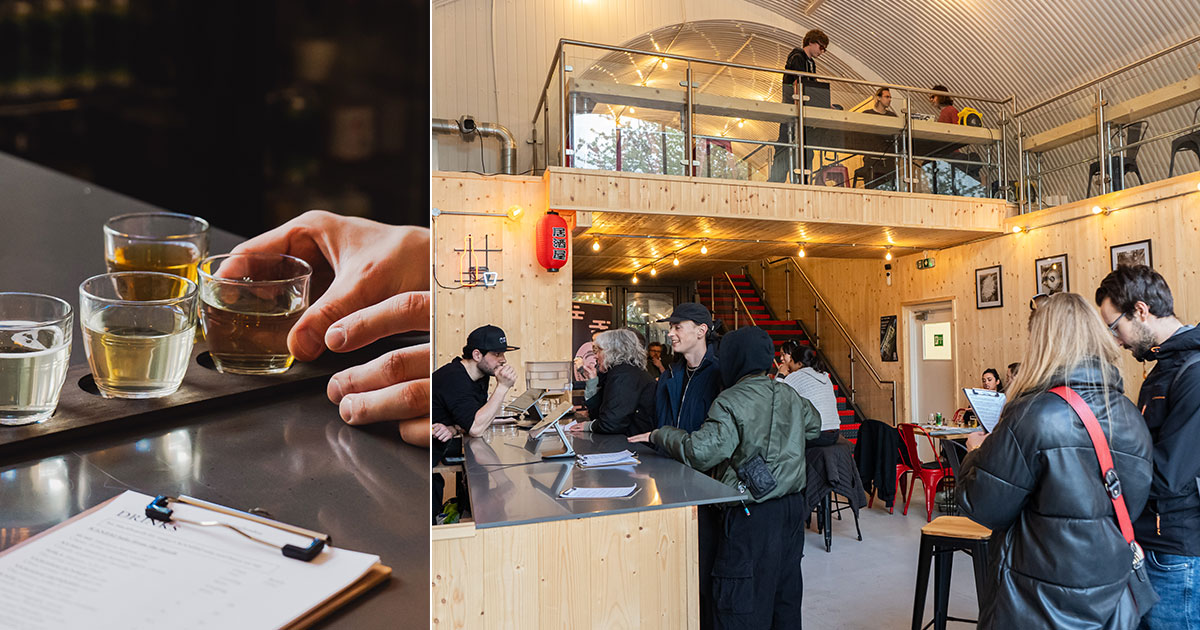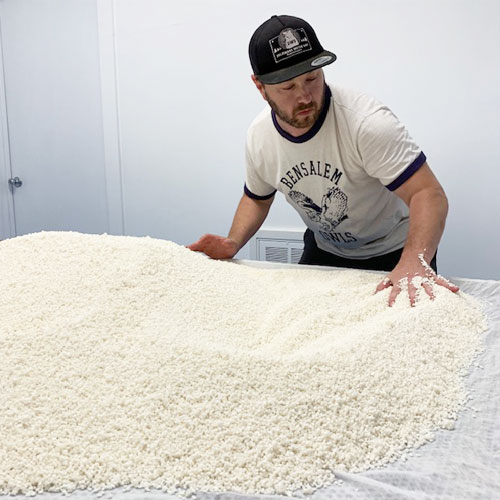Jason Cooper’s fascination with Japanese food and drink began when he lived in Kyoto, Japan while going to language school. “It’s been a 20-year rabbit hole for me,” he says.
After initially focusing on Japanese cuisine with a food truck called Wabi Sabi Kitchen, Cooper decided to open a sake brewery at home in Pennsylvania. Sango Kura opened in Delaware Water Gap in July 2018 and Cooper poured the first sake the following November. In 2022, he added Rewind Brewing, working together with his wife, Melissa Hirschhorn, to bring the vision to life.
Sango Kura serves a Junmai Ginjo sake that’s dry hopped with Galaxy and Mosaic. “It has the nose of an IPA and is floral and fruity,” Cooper explains. This, he believes, is a great way to get beer drinkers interested in trying something new. And offering great food alongside both beer and sake remains a key focus, with a menu consisting of izakaya pub dishes inspired by Japanese cuisine. “We make all of our noodles by hand,” says Cooper.

The brewery’s location in Delaware Water Gap is ideal: just as water quality is key to a fantastic beer, so too for sake. “If you look at a setting of a sake brewery in Japan, it’s always right on top of the best water source,” Cooper says. “The water has so much to do with the quality of sake, because the flavors are so light and delicate.”
Koji—cooked rice inoculated with a culture—is the stuff of life for sake. At Sango Kura, the team makes its own despite the intensive process. “We soak our rice, steam it, and then bring it into a sterile room that we heat up to about 100 degrees for about three days,” Cooper explains. He even stays at the brewery during fermentation so that he can make a quick adjustment if the temperature gets too hot. “It’s a really beautiful process.”
Craft Curious
In London, Kanpai (named for a Japanese toast) is a craft sake brewery that was founded in 2016. The brewery started life in Peckham, with a taproom launch in 2018 before moving to a new home in Bermondsey in 2023. The location among the densely packed cluster of breweries in what is known as the Bermondsey Beer Mile—a hotspot for craft drinkers on a taproom crawl—means more passing trade, especially on Saturdays.
“Because we’re on the Beer Mile, we’re more visible,” says co-founder and head brewer Tom Wilson. Kanpai’s draft-focused taproom creates an environment where beer drinkers feel right at home, and their regular tours offer an educational aspect for those who are curious about the sake brewing process. Wilson found a natural alignment with sake, craft beer, and natural wine. “It was always about having a really accessible craft product [for] curious, discerning drinkers,” he says. Their sake taproom amid a beer hub offers just that.

Kanpai has also collaborated with craft breweries. They worked with Surrey-based brewery By The Horns to produce Shiro, a Japanese white ale brewed with rice, shiso (an aromatic herb), and yuzu (a bumpy citrus fruit).
“What we’re serving on draft is what we call nama sake,” says Wilson, explaining that this version is unpasteurized and raw. It’s best consumed fresh, and better still on the premises on which it was made. “It’s very rare to get nama sake traveling outside of Japan.”
Kanpai’s range offers something for all tastes, from 8% ABV offerings such as a sweet plum sake, and another that is sparkling and dry hopped with Nelson Sauvin. There’s also a white koji sake that checks in at 16.5% ABV. “White koji makes citric acid, which yellow koji doesn’t,” Wilson explains. “It makes a highly acidic sake that kind of drinks more like a white wine.”
Many UK drinkers have encountered sake in sushi restaurants, but in a lot of cases, they are still new to exploring craft sake. And while many of the sakes imported from Japan can be more delicate, Wilson notes that many customers are quick to migrate to the heavy hitters. “First time, they might start with something light, and then they get more adventurous.”
Bridging the Gap
In Covina, Calif., Nova Brewing is another producer making both sake and beer, after taking over a former craft beer premises (once operated by REV Brewing Company). Nova’s Gravity sake is designed to showcase the state’s Calrose rice, which is polished to 50%. Polishing is the process by which outer layers of grain are milled away, removing protein from the rice which can impact the final taste of the sake. Less rice polishing could typically results in a full body and more umami flavor, whereas more polishing can produce a cleaner and lighter sake.
Nova Brewing was founded in 2019, and while the team waited for about a year to get a sake license, they began making beer. The team’s Ginjo 7 beer project was a mission to bridge the two beverages by brewing beer with sake yeast. “When I test batched making beer with sake yeast it created similar aroma and flavor profiles to Belgian style beers… a lot of fruity esters,” co-founder and head brewer James Jin says. An added benefit of using sake yeast for beer is not having to worry about cross-contamination when making both in the same facility.
The beer is brewed with steamed rice and a simple Pilsner grain bill, then fermented at cold temperatures as with sake brewing. The yeast, Kyokai #701, can easily withstand lagering temperatures. “Our goal with the Ginzo 7 beer was to get craft beer drinkers into sake more,” Jin says, adding that people will often come in for a beer flight and will typically also end up trying some sake afterwards, easily finding one that they like.
For Sango Kura, Kanpai, and Nova Brewing, making a conscious decision to engage craft beer drinkers is helping them take their sake businesses to new audiences. “We realized that we need to make what we call sake segue products, for people that don’t really know about sake, or those who think they don’t like it,” Cooper says.
The post Kanpai! How Sake Is Segueing into Craft Beer appeared first on CraftBeer.com.
